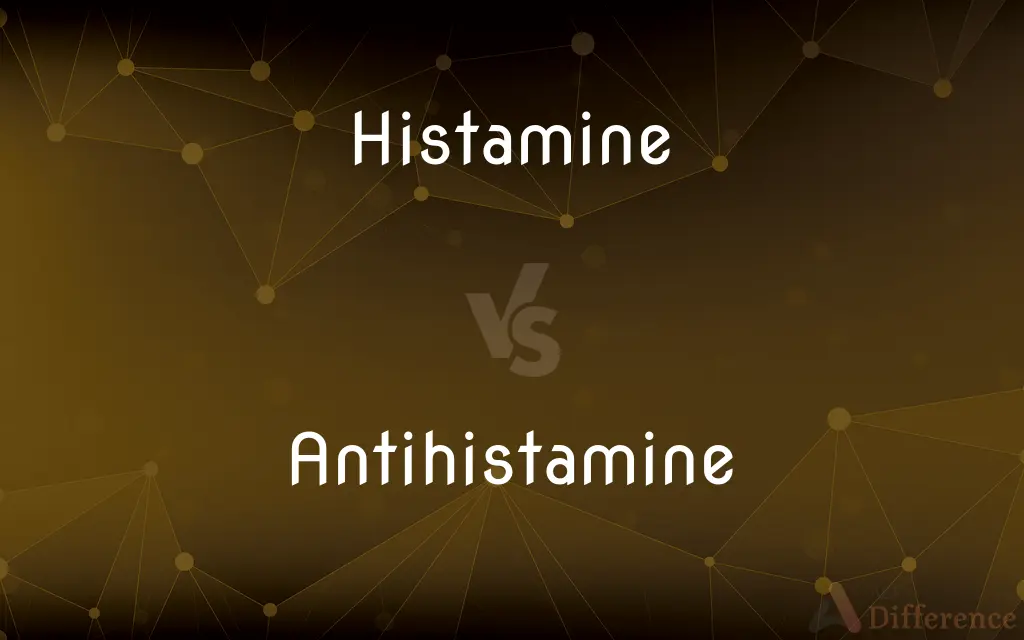Histamine vs. Antihistamine — What's the Difference?
Edited by Tayyaba Rehman — By Fiza Rafique — Updated on April 20, 2024
Histamine is a compound involved in immune responses, causing symptoms like allergies, while antihistamines are drugs that block histamine effects to alleviate these symptoms.

Difference Between Histamine and Antihistamine
Table of Contents
ADVERTISEMENT
Key Differences
Histamine is naturally produced by the body and plays a key role in local immune responses and regulating physiological functions in the gut and acting as a neurotransmitter. Antihistamines, on the other hand, are synthetic compounds designed to counteract the effects of histamine by blocking its receptors in the body.
Histamine can trigger various allergic symptoms such as sneezing, itching, and swelling. Whereas antihistamines are commonly used to relieve these symptoms by preventing histamine from binding to its receptors, thus reducing the severity of allergic reactions.
Histamine levels can increase due to allergic reactions or in response to certain foods and environmental triggers. Antihistamines, however, can be taken prior to exposure to allergens or after the onset of allergy symptoms to mitigate the impact of increased histamine in the body.
While histamine plays a complex role in modulating the immune system and physiological functions, antihistamines are specifically targeted to relieve discomfort caused by excessive histamine activity, especially in allergic conditions and reactions.
Comparison Chart
Function
Triggers immune response and allergies
Blocks the effects of histamine
ADVERTISEMENT
Usage
Produced by the body naturally
Administered as medication
Effects
Causes allergy symptoms
Reduces or prevents allergy symptoms
Role
Acts as a neurotransmitter
May have sedative effects
Response to allergens
Increases in presence of allergens
Used to counteract histamine effects
Compare with Definitions
Histamine
A mediator of itching and allergic symptoms.
Histamine causes the symptoms of hay fever.
Antihistamine
A drug that blocks histamine receptors.
She took an antihistamine to relieve her allergy symptoms.
Histamine
Found in various foods, influencing digestion.
Foods like aged cheeses are high in histamine.
Antihistamine
Some types have sedative effects, aiding sleep.
He used a sedating antihistamine to help him sleep.
Histamine
A biogenic amine involved in local immune responses.
During an allergic reaction, histamine levels can significantly increase.
Antihistamine
Can prevent motion sickness.
Antihistamines are effective against seasickness.
Histamine
Increases vascular permeability, leading to inflammation.
Histamine release can cause hives and swelling.
Antihistamine
Available in various forms, including tablets and liquids.
Antihistamine creams can alleviate skin allergies.
Histamine
A neurotransmitter involved in wakefulness.
High histamine levels are linked to alertness.
Antihistamine
Often used to treat allergic reactions and symptoms.
Antihistamines can reduce sneezing and itching.
Histamine
Histamine is an organic nitrogenous compound involved in local immune responses, as well as regulating physiological function in the gut and acting as a neurotransmitter for the brain, spinal cord, and uterus. Since histamine was discovered in 1910, it has been considered as a local hormone (autocoid) because it lacks the classic endocrine glands to secrete it, however, in recent years, histamine has been recognized as a central neurotransmitter.
Antihistamine
Antihistamines are drugs which treat allergic rhinitis, common cold, influenza, and other allergies. Typically, people take antihistamines as an inexpensive, not patented (generic), drug that can be bought without a prescription and relieves from nasal congestion, sneezing, or hives caused by pollen, dust mites, or animal allergy with few side effects.
Histamine
(neurotransmitter) An amine, C5H9N3, formed by decarboxylation of histidine, that causes dilatation of capillaries, contraction of smooth muscle, and stimulation of gastric acid secretion; it is released during allergic reactions.
Antihistamine
Any of various drugs used to counteract the physiological effects of histamine production in allergic reactions and colds.
Antihistamine
(pharmaceutical drug) A drug or substance that counteracts the effects of a histamine. Commonly used to alleviate the symptoms of hay fever and other allergies.
Antihistamine
A medicine used to treat allergies and hypersensitive reactions and colds; works by counteracting the effects of histamine on a receptor site
Common Curiosities
How does histamine affect allergies?
Histamine can increase during an allergic reaction, causing symptoms like sneezing, itching, and watery eyes.
Are there different types of antihistamines?
Yes, there are first-generation antihistamines, which are sedative, and second-generation, which are non-sedative.
What is histamine?
Histamine is a compound involved in immune responses, regulation of stomach acid, and acting as a neurotransmitter.
Is histamine only bad?
No, histamine plays several important roles in the body, including neurotransmission and digestive functions.
What are antihistamines used for?
Antihistamines are used to treat and prevent symptoms of allergies, such as itching, swelling, and rashes.
Can antihistamines cure allergies?
Antihistamines can relieve symptoms but do not cure the underlying cause of allergies.
What triggers histamine release?
Allergic reactions, certain foods, and environmental factors can trigger histamine release.
Can anyone take antihistamines?
Most people can take antihistamines, but they should be used with caution in certain populations like the elderly or those with certain medical conditions.
Do antihistamines have side effects?
Yes, depending on the type, antihistamines can cause drowsiness, dry mouth, and other side effects.
How quickly do antihistamines work?
Antihistamines start working within 30 minutes.
Share Your Discovery

Previous Comparison
Binoculars vs. Monocle
Next Comparison
Investor vs. ShareholderAuthor Spotlight
Written by
Fiza RafiqueFiza Rafique is a skilled content writer at AskDifference.com, where she meticulously refines and enhances written pieces. Drawing from her vast editorial expertise, Fiza ensures clarity, accuracy, and precision in every article. Passionate about language, she continually seeks to elevate the quality of content for readers worldwide.
Edited by
Tayyaba RehmanTayyaba Rehman is a distinguished writer, currently serving as a primary contributor to askdifference.com. As a researcher in semantics and etymology, Tayyaba's passion for the complexity of languages and their distinctions has found a perfect home on the platform. Tayyaba delves into the intricacies of language, distinguishing between commonly confused words and phrases, thereby providing clarity for readers worldwide.















































